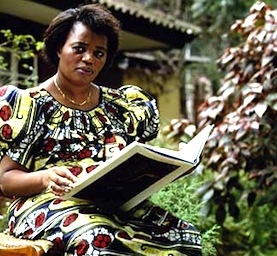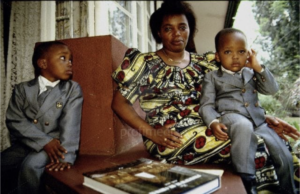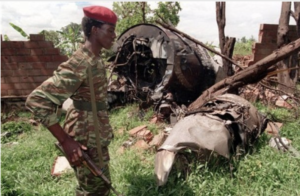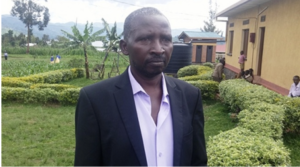
God Will Protect Us All
“In a home where the woman speaks, there is discord.” —Rwandan proverb
Agathe Uwilingiyimana was not known for being quiet. Born an ethnic Hutu in Rwanda in the village of Butare, her parents spent the first few years of her life working in the Congo. By 1957 they returned, and Agathe buckled down to her studies.

In 1973 she received the certification to teach humanities, but she had further to go. After more coursework, in 1976 she completed graduate coursework in chemistry and mathematics and took a position in her home village. By 1983 she was teaching at the National University of Rwanda.
In the same time frame she also married another student and started a family that would expand to five children.

She advanced further throughout the 1980s, creating a credit and cooperative society amongst the Butare school staff, and in 1989 she was appointed to the Ministry of Commerce.
Her work came under fire frequently both for the fact of Agathe’s gender and because she was heavily promoting maths and sciences to female children – something many traditionalists wanted to discourage.
Agathe Uwilingiyimana joined the Rwandan government at a time that was fraught with danger. On 1 October 1990 civil war erupted between the Rwandan Armed Forces (largely Hutu) and the Rwandan Patriotic Front (RPF) (Tutsi). The RPF, led by Paul Kagame after Fred Rwigyema was killed the day after advancing into Rwanda. was composed of Tutsi refugees whose families had fled when Rwanda’s Tutsi monarchy was replaced by a Hutu republic in 1959. The RPF had battle experience, as they had fought for Yoweri Museveni in the Ugandan Bush War.
Initially the RPF gained much ground, but when the French intervened on the side of the Rwandan government, the RPF was reduced to guerilla warfare based in the mountains.
It was amidst this backdrop that Agathe Uwilingiyimana was appointed as the Minister of Education inn 1992. Now, not only did she face public backlash for her policies promoting the education of women, she was loudly berated for abolishing ethnic quotas in academics. To extremist Hutus, Agathe was a traitor.
On 17 July 1993, Agathe again made history when she was appointed the first (and to this day only) female Prime Minister in Rwanda. Many conservative Rwandans were angered at her new position, and at one point Agathe offered to resign. She was convinced to stay, but less than a month later the Arusha Accords were signed to bring an end to the Rwandan Civil War, and Agathe was not granted an official continuation on her position. She did agree to stay on for the next eight months in a caretaker role while a new government was raised.
The fact that Agathe and the Rwandan President Juvenal Habyarimana were both Hutu did nothing to make him like her more. In one notable meeting in Kigali Habyarimana summoned Uwilingiyimana by saying, “You! Woman!”
She responded with, “Don’t speak to me that way! I am not your wife!“
In another incidence, Habyarimana referred to her in a press conference as, “a political trickster.”
The end came more quickly than anyone expected. On 6 April 1994, the plane carrying President Habyarimana and the Burundi President Cyprien Ntaryamira was shot down near Kigali.

In the next two months a million people would be savagely murdered.
With the death of President Habyarimana, Uwilingiyimana became the head of the government, but no one would agree to recognize her. Still, PM Uwilingiyimana managed to speak and give a last public statement to Radio France on the evening of 6 April.
There is shooting, people are being terrorized, people are inside their homes lying on the floor. We are suffering the consequences of the death of the head of state, I believe. We, the civilians, are in no way responsible for the death of our head of state.
There were plans for another address, this time on Radio Rwanda, on the morning on 7 April – but by then a terrible path was already set.
Planning for the Hutu-led genocide began soon after the signing of the Arusha Accords in August 1993. The Hutu political party, Coalition for the Defense of the Republic, refused to recognize the Accords outright; feeling vindicated when the first Hutu President of Burundi, Melchior Ndadaye, was assassinated by Hutu extremists.
UNAMIR, the 2500 strong United Nations peacekeeping force sent to Rwanda received word from an Interahamwe informer that a genocide was imminent. No action was taken.
And so it was very late in the game when UNAMIR sent a contingent of 10 Belgian peacekeepers and five Ghanaians to guard Agathe Uwilingiyimana and her family at around 3 a.m. on 7 April.
By 7 a.m., the troops of the Presidential Guard showed up and demanded that the peacekeepers drop their weapons and that Uwilingiyimana and her husband be handed over. A two-hour stand-off ensued, but Uwilingiyimana and her husband made the choice to surrender themselves with the hope of distracting the murderers and saving their five children.
One of her sons remembered her last words to them, “My mother was behaving as if she woulds not come back and she told us; stay here and do not worry. God will protect us all. My beloved children, always have faith.“
At some point in this situation the ten Belgian peacekeepers were killed.
What happened to Agathe Uwilingiyimana was recorded in the testimony at the International Criminal Tribunal for Rwanda:
Shortly before noon, soldiers discovered Mme Uwilingiyimana in her hiding place. Other soldiers in the area heard the applause and shouts of joy and knew she had been captured. She came out quickly and without a struggle, apparently because she wanted to protect her children who were hiding in the same area. She tried to persuade the soldiers to take her to the military camp. A small group, including some from South Rwanda, were willing to do so. Others refused and wanted to execute her immediately. Captain Hategekimana reportedly arrived and gave the order to kill her on the spot. A lieutenant of the National Police, who was in traininng to become a judicial officer, shot the Prime Minister, blowing away the left half of her fae. Witnesses who came to the house soon after found her nearly naked body on the terrace and carried it into the house. Another witness who passed an hour or so later found that her dressing gown had been thrown up over her body and that a beer bottle had been shoved into her vagina.
Thanks to the heroic efforts of the Senegalese Captain Mbaye Diagne, Agathe Uwilingiyimana’s children were saved and taken to Switzerland.
Agathe Uwilingiyimana’s body was protected from disappearing forever into a mass grave by a morgue attendant named Thadeo Karamaga. Ordered to bury her right away, Karamaga hid the Prime Minister’s body, and when he had to flee the escalating violence, he wrote an identification on her body so she would be properly buried.

The murdered Prime Minister is now buried at the Rwandan National Heroes Cemetery. Of the four women who held high-level government positions at the time of the Rwandan Genocide, Uwilingiyimana was the only one murdered and the only one who did not participate in any way in the killings.
Major Bernard Ntuyahaga was convicted for the murder of the Belgian Peacekeepers by the International Criminal Tribunal for Rwanda. He was not, however, held responsible for murdering Prime Minister Agathe Uwilingiyimana.
To read more about history in Africa, please click here.
- March 26, 2021
- Rwanda

